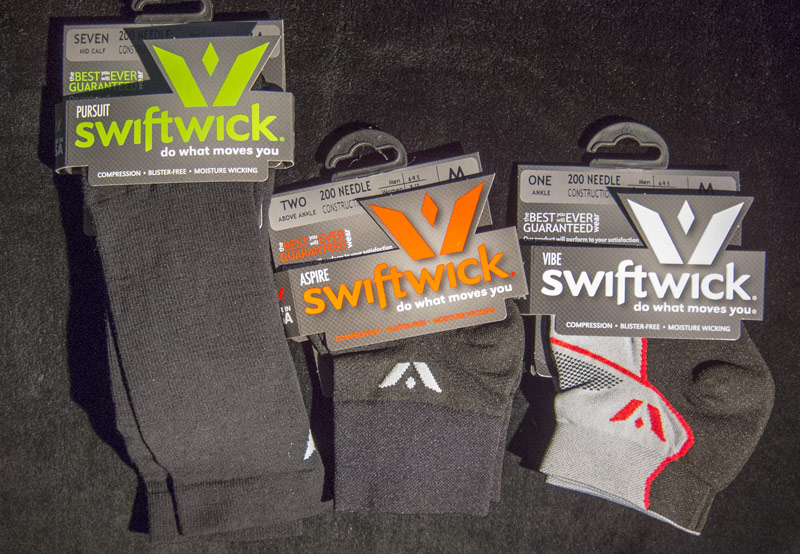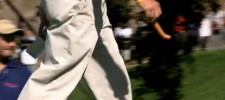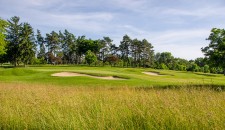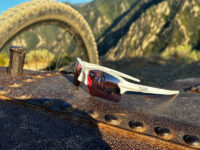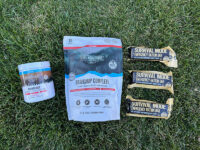Witnessed a Hole in One Yesterday
I witnessed an ace yesterday in my regular Sunday grudge match at Salt Lake City’s Bonneville Golf Course. My buddy/opponent Marius hit a beautiful five iron which drew toward the pin, hit, and rolled straight in the hole. Needless to say, he won that hole. Happy to tie the overall match though!
Wow just witnessed a hole in one by Marius Kvinge! Hole #6 195 yard 5-iron at Bonneville Golf Course. pic.twitter.com/eFEPU2pf7r
— Tony Korologos (@TheGolfSpace) August 17, 2014
I tweeted the event yesterday, so above is an experiment in embedding the tweet. Seems to have worked.
Swiftwick Golf Compression Socks Review
Categories: Golf Apparel • Golf Gear • Reviews
Tags: Swiftwick
I’m currently enjoying the feel of a pair of Swiftwick socks as I write this review. Swiftwick makes compression socks for all sorts of sports and activities, not just golf. Swiftwick is proud of their products as they should be. They’re made with the highest quality materials and state of the art equipment, right here in the USA. Not one Swiftwick sock is made in China.
What exactly are “compression socks?” Compression socks are much tighter than standard socks. This compression helps to improve blood flow and circulation. This improved blood flow and circulation increases endurance and helps the athlete perform better with less fatigue.
On The Course
Despite the fabric being a little thinner than many socks I own, the Swiftwick socks provide great comfort when walking the course. I don’t find that my knees or ankles ache or tire during a round of golf, which is a great thing. It must be due to the increased circulation. Tired feet/legs means a weak base which will result in weak golf swings. From there it is a loss of power, accuracy and eventually a loss of confidence.
Off The Course
As I mentioned, I’m wearing a pair of Swiftwicks at the office today. The comfort level is great and my feet feel wonderful, even though I’m trapped in the cubicle. Around town, hiking, or even working in the back yard I feel the benefits of Swiftwicks and their compression.
Conclusion
While I’m not 100% sure a pair of socks can shave numbers off of your golf handicap, they can help aid in performance, comfort, stability, and endurance. Through their compression technology, Swiftwick socks can help prevent score-trashing fatigue and aches.
Michigan’s Shepherd’s Hollow Golf Club Review
Categories: Course Reviews • Golf Course Architecture • Golf Courses • Golf For Women • HOG World Tour • Reviews
I could move to Michigan, at least during the warmer months. Winter? Not so much. The golf in Michigan is so astoundingly good and interesting. The topography and vegetation lend themselves to such fantastic golf which can compete and even crush competitive golf destinations like Florida, South Carolina, California, or the northwest. The terrain with its great rolling hills and elevation changes makes a great canvas for golf architects to paint their masterpieces.
One such masterpiece is the Arthur Hills designed Shepherd’s Hollow Golf Club, located northwest of Detroit about 45 minutes in Clarkston, Michigan. Shepherd’s Hollow is secluded in a densely wooded area, not near any kind of visible development. Each hole has its own space. Nothing shared. No side-by-side fairways.
Courses
Shepherd’s Hollow features 27 holes. Unfortunately I was only able to play 18 of the 27 during the HOG World Tour stop. I MUST get back there soon to play those again and experience the nine I missed.
There are five sets of tees at Shepherd’s Hollow, allowing the course to accommodate players of all ability levels. The tips for each set of 18 runs roughly 7,100 yards. The primary 18 is an absolute beast of a golf course, rating at 76.0 with a slope of 147. A scratch player would do well to break 80 from the tips.
Tee
Tee shots at Shepherd’s are impressive. The view from each tee is of a hole lined by trees on each side and landing areas which are anything but flat. Tee placement is crucial to have a chance at par, and on this course pars are good. Nearly every tee shot features some kind of elevation change, requiring good strategy and calculation from the golfer.
I really like the different tee sets at Shepherd’s. Different tees don’t just mean a change in yardage. The angle and even elevation of each tee shot is different based on the play of the day.
A very unique feature with regards to the tees is how they are marked. Rather than having two tee markers sitting on the ground which the player must tee off between, one pole on the side marks the teeing area. See image below:
Fairway
If you manage to hit the fabulous fairways at Shepherd’s Hollow, you’ll be presented with challenging lies and approaches.
The stance may promote a draw but the approach may require a fade. One other course does that very well, Augusta National Golf Club.
Green
Ah the greens. What lovely surfaces these are. Such great conditioning and such fun to putt. Tiers, slopes, and swells make putting a fun (but fair) challenge.
Hitting the proper area of the green on approach is as challenging, for finding the wrong spot makes two-putting an accomplishment. Once again, not unfair, but very challenging.
Facilities
The clubhouse and its setting are tremendous. The clubhouse’s classy architecture perfectly fits in with the environment.
Inside the clubhouse is very warm and inviting. The pro shop is full of great gear and apparel while the food and beverage provides some fantastic selections.
The back patio is magnificent! I could hang out there all day. See below.
Conclusion
If asked to come up with one word to describe the whole experience at Shepherd’s Hollow I’d use the word “pure.” The whole experience from the facilities to the course to the area… PURE.
Links
More Hooked On Golf Blog Shepherd’s Hollow Golf Club photos.
Other Michigan golf course reviews
Tiger Woods Bows Out of Ryder Cup Consideration, Saving Tom Watson From Not Picking Him
Categories: PGA Tour • Pro Golf • Ryder Cup • Tiger Woods
Tags: Tiger Woods
I don’t do a lot of Tiger Woods posts. There are billions of other sites regurgitating every bit of news they can find about Tiger, even covering his empty parking spots or his entry into the porta potty. My favorite is when he blows a big snot out of his nose and they show it in super slo-mo on the Konica Minolta Tiger Booger Vision Camera. With the Ryder Cup coming up I feel Tiger is worthy of some commentary here.
Tiger Woods has withdrawn from consideration as a captain’s pick for the Ryder Cup. Here’s his post regarding his withdrawal:
I’ve been told by my doctors and trainer that my back muscles need to be rehabilitated and healed. They’ve advised me not to play or practice now. I was fortunate that my recent back injury was not related to my surgery and was muscular only.
I have already spoken to Tom [Watson] about the Ryder Cup, and while I greatly appreciate his thinking about me for a possible captain’s pick, I took myself out of consideration. The U.S. team and the Ryder Cup mean too much to me not to be able to give it my best. I’ll be cheering for the U.S. team. I think we have an outstanding squad going into the matches.
I plan to return to competition at my World Challenge tournament at Isleworth in Orlando, Florida, Dec. 1-7. It’s an event that’s important to me and my foundation, and it will be exciting to be playing again.
Thankfully this announcement puts an end to the nauseating over-posting of the “should Tom Watson pick Tiger for the Ryder Cup team?” questions. Glad that’s over. Seems like every article and every social network feed had about as many of those posts as the “dump ice on your head” ones. By sheer numbers alone, one might conclude that the Ryder Cup team is better of without Tiger Woods, even when he’s healthy. His record in the event is quite poor. Based on recent play I don’t understand how anyone would remotely consider him for the team. They’re just Tiger homers.
I can’t help wondering if Woods should not have played in the Bridgestone and the PGA this past month or so. He was obviously not at his best yet told the media he was 100% and there to win. Is that denial, stubbornness, rust, or was he really 100% only to become injured again during the course of the Bridgestone? I’d have to question his doctors about that, or Woods himself for perhaps ignoring their advice and playing anyway? We will never know.
Now that Woods has bowed out of any competition until at least the first week of December are we going to be subjected to more posts about how Tiger not being around is killing the golf economy? Probably but I sure hope not. Personally I don’t buy gear or book tee times based on whether Tiger Woods is playing and I don’t know anyone else that does either. The Tiger effect hurts the media, but they took too many trips through the Tiger buffett anyway. Sooner or later the Tiger media bubble was going to burst.
University of Michigan Golf Course Review
Categories: Course Reviews • Golf Courses • Golf Lifestyle • HOG World Tour • Travel
Tags: Michigan Golf
I was just entering the 2014 college football schedule into my calendar for my Utah Utes. Tough go for us being fairly new in the Pac-12, but I digress. The 3rd game on the schedule this season is at the “Big House,” also known as the University of Michigan’s football stadium. The place holds something like 12.2 million fans. A few weeks ago I was across the street from the big house playing golf at the University of Michigan Golf Course. What a fantastic place. The course is not quite publicly accessible, but there are several ways one can get a round in on this wonderful layout. If you get the chance, do it.
The course is the home of the Michigan golf teams and is closed for play during competitions. The course is also closed on football days, where it doubles as a parking lot.
Design
Ever heard of Alister MacKenzie? He designed the University of Michigan Golf Course, which opened in 1931. He’s the same golf course architect who designed Augusta National Golf Club (home of the Masters Tournament) with the help of Bobby Jones. One other highly ranked architectural masterpiece he created was Cypress Point.
Having visited Augusta National many times, I could definitely get the feel of MacKenzie’s style and creativity at the University of Michigan course. The way he utilized the rolling hills, angles, and elevation changes on the property is magnificent.
Arthur Hills performed a restoration on the course in 1994, which according to the University of Michigan, “restored the grandeur of the University Golf Course to the ranks of MacKenzie’s other classics.”
Total yardage for the golf course from the tips, also known as the Wolverine Tee, is 6687 yards. The course rating is 72.0 and slopes at 135. These numbers translate to a strong challenge, but not over the top in terms of difficulty. There are three other tee sets for players of varying age, gender, and ability level.
Tee
I’m not sure which club I prefer the most on the tees at the University of Michigan Golf Course, my driver or my Nikon. The framing of the holes from the tees is fabulous.
Tee shots are not extremely difficult, but with the movement of the course, trees lining the fairways, and some deep native grass areas, errant tee shots are one-way tickets to bogey land.
Fairway
Like Augusta National, the fairways at U of M roll with the hilly terrain. Challenging lies await, producing approaches which are a fine test of shotmaking. The fairways are not overly narrow, but due to the movement of the holes, proper placement is a big advantage on approach shots.
There are many “course management” scenarios. On some par-4 holes and even one particular par-5 (3rd hole) driver may not be the perfect club to hit off the tee, but is still an option.
Green
The greens are very fun and unique at the U of M course. First, they are not terribly large so hitting them in regulation is a solid accomplishment.
There are very large undulations and tiers in the greens which can break those medium to small sized greens into even smaller areas. If an approach finds the wrong one, two-putting is a challenge but not impossible.
The shaping and framing of the greens on this course is very pleasing to the eye.
Facilities
Full supporting facilities in the form of practice areas, pro shop, and dining are offered at U of M.
Conclusion
Playing the U of M golf course was a fantastic experience. I loved the layout, the flow, routing, scenery, and especially the conditioning. I strongly recommend playing the course if you get the chance. I cannot wait to get back and take another shot at it.
Related Links
Hooked On Golf Blog University of Michigan Golf Course photo gallery.
Other Hooked On Golf Blog Michigan golf reviews.
« Previous 1 … 25 26 27 28 29 … 74 Next »

